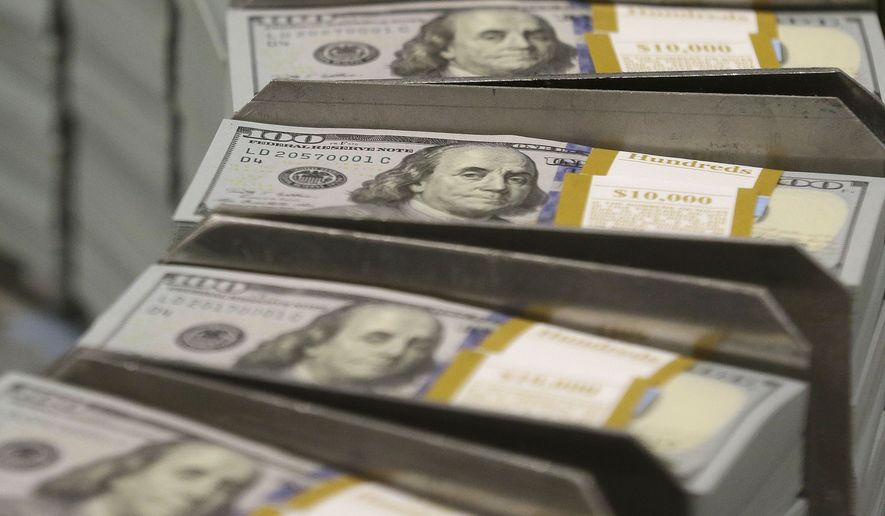Democrats’ plan for $3.5 trillion in new spending on social programs, the biggest package ever proposed, would eat up nearly all of the government’s annual tax collections.
Funding the spending plan would require President Biden’s proposed tax increases or more federal borrowing — or both.
The federal government collected $3.8 trillion in tax revenue in fiscal 2021 to pay for defense, health care, Social Security, veterans’ services, education and a host of other annual expenses.
Mr. Biden has proposed raising taxes by about $2.5 trillion over 15 years to pay for his infrastructure and safety net plans. The administration says beefed-up tax collection would add $700 billion and savings elsewhere in the budget would cover the rest of his new spending.
Democrats also are projecting that a stronger economy will boost tax revenue. Conservatives say such budget forecasting is optimistic given Mr. Biden’s proposed tax hikes.
“The president’s proposed increases in the corporate tax rate and the other tax increases would really harm the economy, cost jobs, reduce wages and restrict economic growth,” said Matthew Dickerson, director of the Grover M. Hermann Center for the Federal Budget at The Heritage Foundation.
If any or all of the Democrats’ revenue-raising proposals fail, then the government would have to borrow more to cover the difference. Budget analysts for both parties say it’s unwise to run up more trillion-dollar annual deficits after record-breaking emergency spending during the pandemic in the past year.
The total outstanding U.S. debt has climbed to more than $28.4 trillion. Although countries such as Japan and China own substantial sums of U.S. debt, American taxpayers are liable for the vast majority.
The public holds $22.1 trillion, more than three-quarters of the total debt. Foreign governments hold about one-third of that $22.1 trillion, led by Japan with $1.2 trillion and China with $1.1 trillion.
The rest of the $22.1 trillion is owned by U.S. investors, the Federal Reserve, pension funds, banks, state and local governments and other entities.
Another $6 trillion of the overall $28.4 trillion is intragovernmental debt that the Treasury owes to other federal agencies. As of June 30, Social Security trusts held nearly half of those Treasuries, $2.9 trillion, because the trusts take in more revenue than they spend each month and invest the remainder in government debt.
Mr. Biden and congressional Democrats say tax increases on corporations and individuals earning more than $400,000 a year would pay for most of their $3.5 trillion spending plan, plus another $579 billion for roads and bridges. The president also wants to raise the top capital gains tax rate from 23.8% to 43.4%.
Sen. Mark R. Warner, Virginia Democrat, has said tax increases would fully pay for the proposed spending.
Some conservatives doubt that Democrats have the support in the narrowly divided Congress to approve what would be one of the largest tax increases in history.
“Setting aside the simple arithmetic impossibility of this, Dems have not shown that they can pass *any* substantial tax hikes in decades,” tweeted Brian Riedl, a senior fellow at the Manhattan Institute and former chief economist to Sen. Rob Portman, Ohio Republican.
Mr. Riedl said that in the “extreme unlikelihood” that Democrats do approve trillions of dollars in offsetting tax increases, “there would be almost no plausible taxes left to address the $100 trillion in baseline deficits over the next 30 years.”
Senate Minority Leader Mitch McConnell said no Senate Republicans will support the $3.5 trillion package. The nation, he said, can’t afford “new spending and taxing at a time when the country is already suffering a 40-year high inflation as a result of what [Democrats] did earlier this year.”
The Kentucky Republican said on the Senate floor that Democrats are trying to “inflate their way out of inflation.”
“Democrats say they’ll probably pair this spending spree with a set of massive tax hikes, dumped right on top of our economic recovery,” Mr. McConnell said. “Our colleagues need to take this summer and think very carefully about what they’re discussing. It would be hard to imagine a proposal less suited to the conditions our country is facing. Americans cannot afford another socialist borrowing, taxing, and spending spree that will kill jobs and raise costs for working families.”
The Congressional Budget Office projects that deficits will total $3.0 trillion in 2021 and $12.1 trillion over the next decade under current law.
The national debt stood at $19.9 trillion when President Trump took office in January 2017. By October 2020, it had risen to $27 trillion — an increase of nearly 36% in less than four years. Two months after Mr. Trump left office, it reached a new high of $28 trillion.
In eight years under President Obama, the debt rose by $8.6 trillion, or 74%.
Maya MacGuineas, president of the Committee for a Responsible Federal Budget, said the pace of growth in the national debt “is not sustainable.” She said interest payments alone on the debt will cost $1.5 billion per day over the next decade.
“While it made sense to borrow to weather the pandemic and jump-start the recovery, the strong economic growth projections from CBO show that it is time to pivot away from further deficit financing and towards paying for things and, ultimately, decreasing the national debt from its current path,” she said. “It is very encouraging to hear calls by many to pay for important new initiatives, such as investments in infrastructure, education and workforce development. But our fiscal situation demands real offsets that allow us to reap the benefits of these investments – not ones that paper over the issue or don’t even try to prevent deficits from growing larger.”
• Dave Boyer can be reached at dboyer@washingtontimes.com.




Please read our comment policy before commenting.